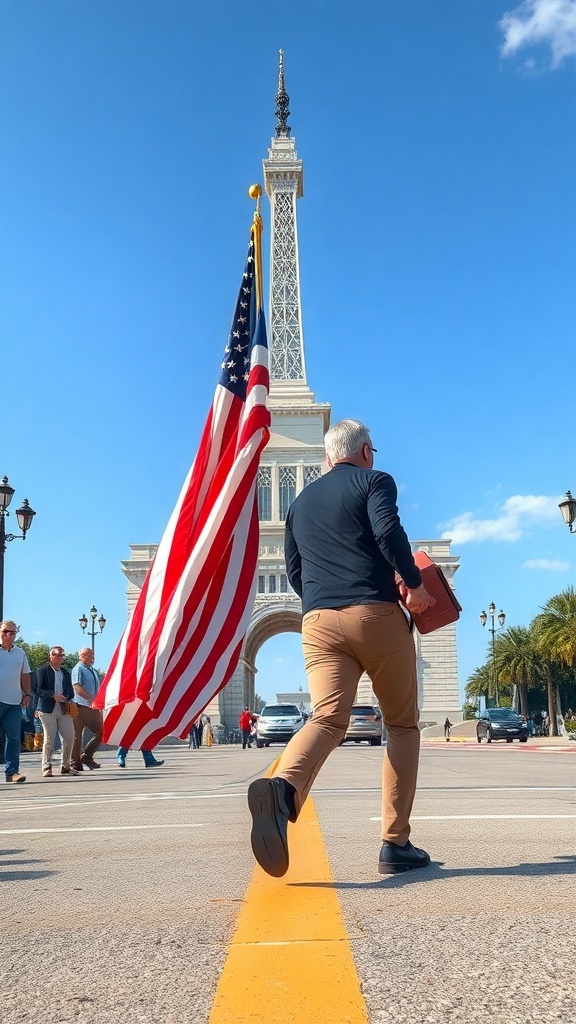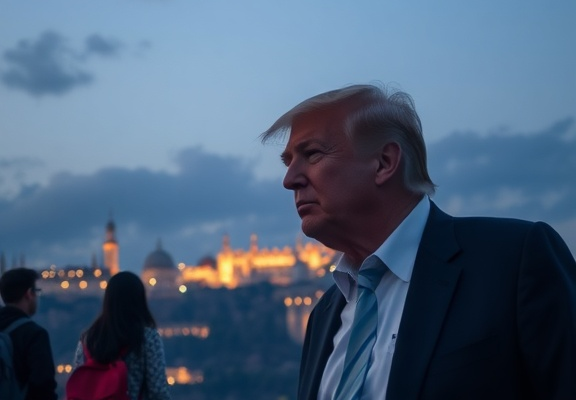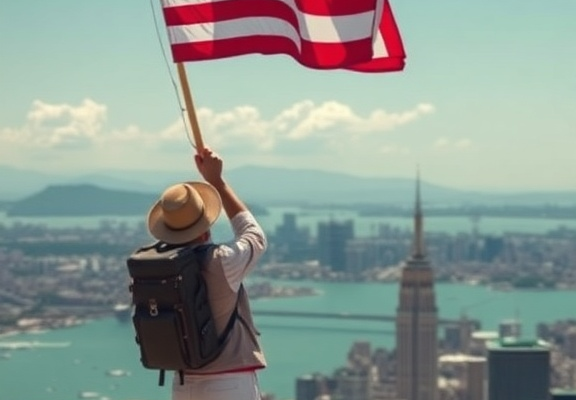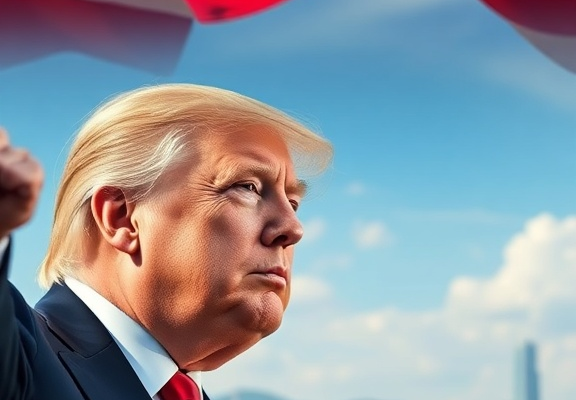The Impact of Trump-Driven Tourist Drop on Global Travel Trends and Economies
The recent years have seen a notable shift in global travel trends, notably impacted by political dynamics, particularly those associated with the Trump administration. The decline in international tourism to the United States correlates with various factors, including stringent immigration policies and heightened travel advisories. For travelers around the world, this represents a complex situation where political decisions have triggered a ripple effect on the overall travel economy.
Thank you for reading this post, don't forget to subscribe!Tourists have historically flocked to the U.S. for its iconic landmarks, cultural diversity, and vibrant cities. However, since Trump took office, there has been a significant drop in foreign visitors. This decline has been fueled by perceptions of unwelcoming policies and a less friendly environment. In many cases, potential travelers reconsider their plans or opt to explore other destinations. Such shifts alter not only individual plans but also have broader implications for global travel trends and associated economies.
Here are several key areas affected:
- Revenue Loss: The overall financial impact on the U.S. economy is substantial. The decline in foreign travelers leads to a drop in earnings for hotels, restaurants, and entertainment venues heavily reliant on tourism.
- Job Losses: Many sectors associated with the travel industry face job insecurity. As businesses shrink due to declining customers, layoffs become inevitable, adversely affecting local economies.
- Shift in Travel Patterns: With travelers avoiding the U.S., many are exploring alternative destinations in Europe, Asia, and Latin America, leading to shifts in global travel patterns.
These changes in travel behaviors also translate to varying tourist demographics. Countries previously overlooked are seeing an uptick in travelers as people seek new experiences in less conventional locations. Emerging tourism markets have become more appealing as travelers search for safety and cultural richness, sometimes even circumventing traditional destinations.
The rise in alternative tourist environments can lead to economic growth for these countries, attracting investment and enhancing infrastructure. Countries like Canada, Mexico, and various Central American nations are now strategically positioning themselves as favorable tourist destinations. They capitalize on the U.S. tourist drop, promoting their unique offerings and creating packages that attract former U.S.-bound travelers.
Additionally, as travelers scale back on their plans to the U.S., they frequently resort to more affordable locations, altering their travel budgets. Budget accommodation, off-peak travel, and package deals in regions not typically on the travel radar are gaining traction. This marks a significant trend shift wherein your wallet dictates travel, rather than just luxury and leisure considerations, influencing destination choices further.
In severe weather, political unrest, or health-related crises, U.S. travel policies can also influence how various destinations manage incoming tourists. Countries sensitive to the current socio-political climate of the U.S. are adjusting their hospitality and marketing strategies accordingly. This includes enhancing tourist safety protocols and promoting welcoming policies to attract those avoiding the U.S.
Meanwhile, the implications of these trends are not one-sided. Global tourism bodies have been urging the U.S. to soften its stance and reevaluate immigration policies. The hope is that a more welcoming approach could restore visitor confidence and spark a renewed influx of tourists. Should policies ease, the potential economic recovery could be significant as the U.S. regains its footing in the global travel market.
In light of the Trump administration’s policies, the travel landscape continues to evolve. As you consider future travel plans, staying aware of how these dynamics interplay can enrich your understanding of global tourism. Recognizing the factors influencing where you travel goes a long way in making informed, satisfying travel decisions.
Cultural exchanges and economic interdependence are essential components of global tourism, emphasizing how interconnected we all are. Being aware of the bigger picture not only aids in planning but fosters a sense of global citizenship. Whether you decide to explore international cities or stay closer to home, understanding these influences can lead to more enriching adventures.
Analyzing the Effects of the Trump-Signed $250 Visa Fee on International Travelers
The decision to implement a $250 visa fee for international travelers has considerable implications. This fee, signed into law during Trump’s presidency, adds another layer of complexity to the already challenging landscape of international travel. Let’s break down the potential effects on travelers.
First, let’s look at who is affected by this fee. Primarily, the new visa fee impacts individuals from countries that require a visa to visit the United States. This group includes tourists, business travelers, students, and immigrants. The increase in costs can deter many from planning their trips altogether.
Financial Impact on Travelers
One of the most immediate effects of the $250 visa fee is the financial burden on travelers. Here are some key points to consider:
- The fee can make a trip to the U.S. significantly more expensive—especially for families or groups.
- This fee affects budget travelers the most, leading some to opt for alternative destinations that do not impose such high costs.
- Countries with lower average incomes may see a sharper decrease in travel, as the fee can represent a larger percentage of disposable income.
Additionally, travelers often budget for accommodations, flight costs, and activities when planning their trips. The added visa fee may prompt them to reassess their travel plans entirely. You want to remember that when your wallet feels lighter, your enthusiasm for the trip can dim.
Effect on Tourism Industry
The tourism industry in the U.S. thrives on the influx of international visitors. A drop in travelers can have a ripple effect throughout various sectors:
- Hotels, restaurants, and attractions rely on foreign visitors for a sizable portion of their income.
- Travel agencies and tour operators will likely see fewer bookings, leading to job losses and reduced revenues.
- Areas that depend largely on tourism, such as theme parks, historical sites, and beach resorts, could face economic downturns.
Travelers who might otherwise visit could choose to explore other countries that are more accessible and cost-effective. This shift can hurt not only the hospitality industry but also the economy as a whole. As Americans know, tourism brings vibrancy to cities, and fewer visitors could mean less excitement and engagement.
Public Sentiment and Travel Behavior
The introduction of the visa fee can also affect public sentiment toward traveling to the U.S. You might notice some travelers expressing frustration and disappointment. This psychological impact is worth mentioning because where travelers once felt an eagerness to visit the states, some may now hesitate.
Engagement with U.S. culture could drop as interaction takes a hit. To avoid higher costs, many might decide to visit countries they perceive as more friendly and accommodating. This sentiment can influence long-term shifts in travel behavior, making it crucial to understand the broader ramifications.
Policy Adjustments and Future Implications
While the $250 visa fee might seem like a straightforward financial decision, the long-term implications are complex. It is not uncommon for travel policies to evolve. Stakeholders, including governments and organizations related to tourism, may call for revisions or a reevaluation of the fee:
- In response to decreased travel, policies may become more lenient or even eliminate the fee.
- Potential international agreements could emerge, focusing on collaboration and intercultural exchange.
- Travelers may find new advocacy groups that focus on easing the burden of visa costs.
As you analyze the effects of this fee, consider how it will resonate across the globe. The $250 visa fee signed by Trump poses a double-edged sword. Travelers may face financial hardship, while the tourism sector struggles to maintain its vibrancy amidst these changes. Understanding these dynamics can ultimately shape how successful international travel can be in the coming years.
Ultimately, international travelers deserve to navigate a landscape that welcomes them rather than one that imposes barriers. This balance will define not just individual experiences but the health of the broader tourism ecosystem.
Conclusion
The combined effects of a Trump-driven tourist drop and the introduction of a $250 visa fee present a significant challenge for global travel and tourism. The decline in visitors to the United States is not just a setback for the American economy; it also influences travel patterns worldwide. Many countries rely heavily on tourism as a pillar of their economic stability, and a noticeable decrease in American and international travelers can ripple through various sectors.
Simultaneously, the added financial burden of a $250 visa fee is creating barriers for potential tourists, discouraging them from visiting the U.S. This hefty fee may deter individuals who are already facing economic uncertainties or prioritizing experiential travel elsewhere. The U.S. tourism industry risks alienating a generation of travelers, making it crucial for policymakers to reconsider these measures.
Looking ahead, addressing these intertwined issues will require innovation and adaptability. Countries striving to attract international travelers must balance safety and accessibility while finding ways to remain competitive in an evolving landscape. Advocating for more welcoming travel policies, promoting cultural exchange, and re-evaluating visa regulations can help mitigate the impacts of decreased tourism.
As travel continues to evolve post-pandemic, understanding the consequences of policies like the visa fee and acknowledging the broader effects of tourism trends will be essential. Ultimately, creating a more inviting atmosphere for travelers will benefit not only the U.S. economy but also global ties, fostering collaboration and cultural understanding through travel.






